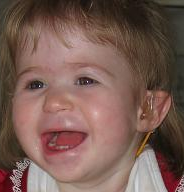Chromosome 1p36 Deletion Syndrome

1p36 deletion syndrome is a chromosome disorder that typically causes severe intellectual disability. Most affected individuals do not speak, or speak only a few words. They may have temper tantrums, bite themselves, or exhibit other behavior problems. Most have structural abnormalities of the brain, and seizures occur in more than half of individuals with this disorder. Affected individuals usually have weak muscle tone (hypotonia) and swallowing difficulties (dysphagia). Other features include a small head that is unusually short and wide; vision and hearing problems; abnormalities of the skeleton, heart, gastrointestinal system, kidneys, or genitalia; and distinctive facial features. 1p36 deletion syndrome is caused by a deletion of genetic material from a specific region in the short (p) arm of chromosome 1. Most cases are not inherited; only about 20% of the cases of people with 1p36 deletion syndrome inherit the chromosome with a deleted segment from an unaffected parent. In these cases, the parent carries a balanced translocation, in which no genetic material is gained or lost. There is no cure for this syndrome. Treatment depends on the symptoms, and may include rehabilitation/educational programs, antiepileptic medication, and standard treatment for heart, kidney, eye, hearing or bone problems.